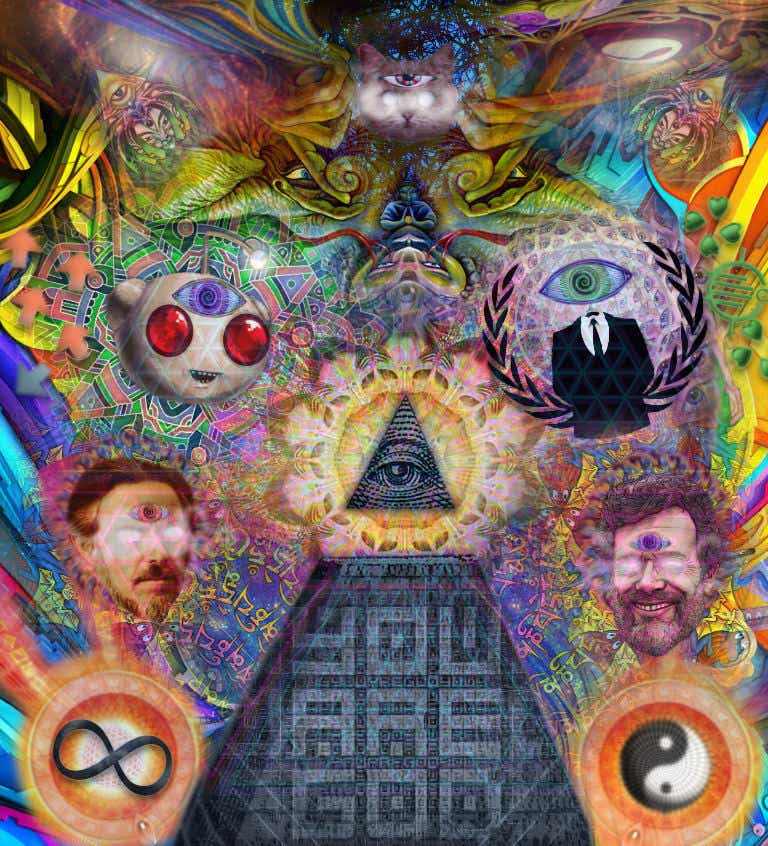Contents
Today, there is a silent Psychedelic renaissance going on, with individuals seeking ‘spiritual’ respite as well as ‘Healing’ from the Holy and Divine Mother Ayahuasca from the countless Sacred Ceremonies either in the Amazons or all over the world.
Numerous researches have already demonstrated the benefits of consuming various Holy Plant-based Medicines like Psylocibin, synthetic substances which are Psychedelic in nature, and the Holy Medicine which can provide ‘Healing’ from the Holy and Divine Mother Ayahuasca.
Though it is still not clear how the ancient cultures all over the world had a deep understanding of Holy Plant-based Medicines, many scientific studies have been conducted which has demonstrated that ancient people all over the world had traditions of ingesting Holy Plant-based Medicines, with intention to access altered state of consciousness, with the ‘intent’ being divination, to aligning body-mind-spirit, to detoxification of energetic body or to achieve spiritual knowledge and spiritual-development.
By analysing ancient cultures’ artefacts, their way of living harmoniously with nature, and the vast fields of consumption of these mind-altering Holy Plant-based Medicines, suggest that the Holy Plant-based Medicines were the holistic approach taken by these ancient cultures.
Unfortunately, over the generations, most of humanity lost the ancient ancestral wisdom of holistic healing and lost connection with Mother Nature too which created an yearning urging to dive deep within ourselves to find the connection again.
All the depression and anxiety on a mass level, some suggest, is being experienced as a manifestation of ignoring the inner call.
Who are Psychonauts
From time to time, some explorers had listened to this calling and went out in search of soul connection, with few finding ancient tools of diving deep within oneself, and some discovering new ways of re-establishing that connection. From Aldous Huxley to Timothy Leary to Terrence McKenna, they are now known as the navigators of the soul, who inspired a generation into experimenting with the tools of exploring the soul.
This generation is now known as the “Psychonauts” or “Cyber Psychonauts” or “e-psychonauts”. They are bringing back shamanism in modern times by understanding the effects of the Holy Plants which are Psychoactive in nature, through deliberate experimentation with the help of numerous scientific studies.
According to the experts, psychonauts take an almost scientific approach to documenting their experiences and sharing them on online platforms.
Profile of psychonauts
There was not enough information about the profile of psychonauts until Barbara Sahakian and her team conducted a study on them and concluded that psychonauts are usually single, young adult men with good IT skills and well-educated. They often report feeling more euphoric, alert, empathic, and creative when ingesting Psychoactive Holy Plants or hallucinogenic substances.
Psychonauts keep records of their experiences and frequently communicate with each other in online forums to discuss new Psychedelics trends. Therefore, these online forum communities provide a unique platform to interact with like-minded individuals in an anonymized and open manner. Their main aim seems to share information about the purity of the Medicines, safety prior to experimentation, dosage, and connecting the dots with the ancient ‘ways’ of ‘healing’.
Cognition processes
The overarching concept of human cognition has been a phenomenon of much interest for decades. Psychological researchers have spent years trying to understand how we think about ourselves, others, and the world in many different contexts. A wide variety of phenomena falling under the umbrella term of “cognition”.
According to the researchers, the cognitive process can be divided into “hot cognitive process” and “cold cognitive process”, connecting two partially segregated loops in the brain.
Hot cognition process: This refers to a cognition process which involves emotional or social aspects of human beings. Common examples of hot cognition are risk-taking and reward learning. The hot cognition loop includes the orbitofrontal cortex, which involved a risky decision-making process.
Cold cognition process: This is generally thought of as a more classic category of cognition process, which is existing in the domain of reason and logic without relying on the input of the individual’s social or emotional context. The cold loop includes the dorsal lateral prefrontal cortex, which is involved in planning.
Comparing cognition process of psychonauts with regular people
In one of the latest research, Barbara Sahakian and her team explored psychonauts’ personalities and cognition processes. To do this, they recruited 82 participants and divided them into three groups. These included psychonauts, “club drug” users who were seeking help for their addiction, and non-drug users.
After screened for psychiatric illnesses of the participants, the research team conducted the study on several stages with neuropsychological tests, interviewing to assess the reason for substance ingestions, which successfully demonstrated the differences in both personality and cognition process among these three groups.
The study authors showed that psychonauts had no problem in the cold cognitive process that we usually use at work, such as planning, maintaining attention, and problem-solving. But they were different from non-drug users in terms of the hot cognition process. For example, the psychonauts took more risks than others and showed high levels of sensation-seeking traits, which indicates they may be driven by the need for excitement or pursuing novel experiences.
The “club drug” users group was identified from among people who are already seeking help for addiction at the clinic. This group had major cold cognition problems in learning and memorizing. They also showed difficulties in controlling impulses. The same result was observed with research on cocaine-dependent individuals, who tend to have problems with both cold and hot cognition processes. For example, this group prefers immediate smaller rewards rather than waiting for larger delayed rewards. This group likes things now and does not want to wait even if they lose something bigger later.
The authors suggested that the fact that psychonauts have no problem in the cold cognition process may assist them to be aware of the damaging effects of excessive drug dosage and restrain them from getting into harmful drug use. The authors further explained that since one of their main motivations is to fully enjoy and experience the effects from ingesting novel hallucinogenic substances or the Holy Plant-based Medicines which are Psychoactive in nature or the Holy Medicine, and to share about their experience in detail with other like-minded people, they remain very cautious about the doses and the Holy Medicines which they ingest. The authors also mentioned that psychonauts are more positive about their lifestyles.
The authors wished for another long-term study on the psychonauts and “club drug” users to understand whether the Medicines cause changes in cognition or whether their sensation-seeking traits become stronger with more time spent sharing experiences with other like-minded people on forums.
Conclusion
There are many examples of clinics, like the Bristol clinic in the UK, which has already started to offer ketamine-assisted psychotherapy for mental health disorders. Hallucinogenic substances, Holy Plant-based Medicines like Psilocybin, and the Holy Medicine of the Holy and Divine Mother Ayahuasca, are being researched as pharmacotherapy for treatment-resistant depression and other mental health conditions which are not easy to treat, like eating disorders.
It surely seems that humanity is on way to bringing back ancient and ancestral ‘ways’ of ‘healing’, with many clinical trials for Psychedelic substances and Holy Plant-based Medicines ongoing to obtain broader regulatory body approval, and with many startups attempting to bring Holy Plant-based Medicines and the Holy Medicine of the Holy and Divine Mother Ayahuasca more closer and make more accessible to humankind.
Experts suggest that more research is needed to better understand the altered state of consciousness, including their therapeutic potential. The researchers also suggested that continued engagement with psychonauts, both online and offline, may help in the ongoing and future scientific studies.
Reference
- BBC. (2021). First ketamine-assisted psychotherapy Bristol clinic opens. [online] Available at: https://www.bbc.com/news/uk-england-bristol-56170592 [Accessed 2nd August 2021].
- Dalley, J. W., Robbins, T. W. (2017). Fractionating impulsivity: neuropsychiatric implications. Nature Reviews Neuroscience, [online] Volume, 18, p. 158-171. Available at: https://www.nature.com/articles/nrn.2017.8 [Accessed 2nd August 2021].
- Dickinson, D., Iannone, V. N., Wilk, C. M., & Gold, J. M. (2004). General and specific cognitive deficits in schizophrenia. Biological Psychiatry, [online] Volume, 55, p. 826-833. Available at: 10.1016/j.biopsych.2003.12.010 [Accessed 2nd August 2021].
- d’Angelo, L. S. C., Sahakian, B., Savulich, G. (2017). Lifestyle use of drugs by healthy people for enhancing cognition, creativity, motivation and pleasure. British Pharmacological Society, [online] Volume, 174(19), p. 3257-3267. Available at: https://doi.org/10.1111/bph.13813 [Accessed 2nd August 2021].
- Lawrence, A., Clark, L., Labuzetta, J. et al. (2008). The innovative brain. Nature, [online] Volume, 456, p. 168–169. Available at: https://doi.org/10.1038/456168a [Accessed 2nd August 2021].
- Prayag, G., Mura P., Hall M. C. & Fontaine, J. (2016). Spirituality, drugs, and tourism: tourists’ and shamans’ experiences of ayahuasca in Iquitos, Peru. Tourism Recreation Research, [online] Volume, 41(3), p. 314-325. Available at: https://doi.org/10.1080/02508281.2016.1192237 [Accessed 2nd August 2021].
- Sahakian, B., Savulich, G., Stephenson, R., et al. (2021). “Hot” and “Cold” Cognition in Users of Club Drugs/Novel Psychoactive Substances. Frontiers in Psychiatry, [online] Available at: https://doi.org/10.3389/fpsyt.2021.660575 [Accessed 2nd August 2021].


